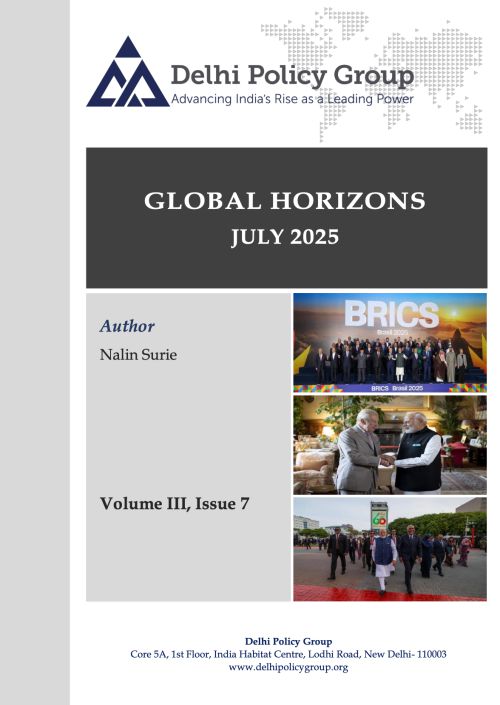Global Horizons
This issue opens with the author’s observations on the announcement of higher US tariffs on nations across the globe, with little regard for the inevitable impact on the international trading order and the world economy. Brazil, Canada and India were singled out for higher tariffs, as political considerations and pressures to accede to US demands played a critical role in these unilateral decisions.
As the world focused on safeguarding its trade interests, the war in Ukraine continued to impose a heavy toll on both sides of the conflict and peace talks failed to advance. The burden of paying for Ukraine’s weapons and economic needs shifted to Europe.
The humanitarian situation in Gaza continued to deteriorate, as mass deprivation led to starvation deaths and relief supplies were severely restricted, while the US largely looked away. France, the UK and Canada announced that they were ready to recognise a Palestinian state if this drift continued.
In Europe, the UK’s outreach to the EU, France and Germany gathered momentum through major summits and declarations.
The EU-China summit revealed growing tensions over trade imbalances, drawing a pushback from the Chinese leadership.
Meanwhile, the 17th BRICS summit was hosted by Brazil on July 6-7, with substantial high level participation and and an extensive Declaration on subjects ranging from strengthening multilateralism to reforming global governance and promoting inclusive development. BRICS members asserted that they would not go along with sanctions that were not approved by the UNSC.
PM Narendra Modi paid landmark bilateral visits to Ghana, Argentina, Brazil, Trinidad and Tobago, Namibia, the UK and the Maldives.
The month saw the signing of the India-UK Comprehensive Economic and Trade Agreement, as well as the adoption of an India-UK Vision 2035 document focused on the consolidation of bilateral cooperation across five strategic pillars.
The month ended with a cloud over India-US relations, with President Trump repeatedly signalling displeasure on issues ranging from trade to India’s ties with Russia and unwillingness to give him credit for bringing about a India-Pak ceasefire, which stood out in stark contrast to Pakistan’s readiness to accede to every US demand.
India was slapped with 25% tariffs on its exports to the US, and more were threatened. India’s response was measured, underlining commitment to mutually beneficial relations based on respect and equality.
The author concludes that as the breakdown of trust and growing uncertainty mark the international environment, greater dialogue and diplomacy are the need of the hour.
To read this issue of Global Horizons, Vol. III, Issue 7, please see the PDF attached.



